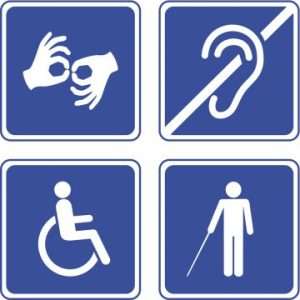
The United States Constitution guarantees all individuals the right to be treated with dignity, equality, and respect. This obviously includes individuals, like myself, who have a disability. Too often, I read about law enforcement interactions with disabled people gone terribly wrong. It’s tragic and heartbreaking for a lot of reasons, but for me, knowing that these situations can and should be avoided if only law enforcement follow the law is too much to take. I get frustrated because laws like the Americans with Disability Act (“ADA”) are supposed to protect us from discrimination and ensure us equal access to all aspects of society, including the criminal justice system.
The ADA contains important tools to establish and enforce equal treatment. Among its many important features, the ADA requires state and local governments to treat people with disabilities equally. Specifically, Title II states: “Subject to the provisions of this title, no qualified individual with a disability shall, by reason of such disability, be excluded from participation in or be denied the benefits of the services, programs, or activities of a public entity, or be subjected to discrimination by any such entity.” In other words, public entities like state and local law enforcement (e.g. the Chicago Police Department) must comply with Title II and are required to provide reasonable accommodations to people with disabilities.
Unfortunately, law enforcement officers are often unaware of or choose to ignore their obligations under various disability laws and in turn, violate the rights of disabled people. Chicago recently entered into a consent decree designed to address this concern by providing training to CPD officers on disability rights. While this training is an important step, it does not guarantee officers will comply with the law or understand disability rights. And so, the disability community must do what we have always done; speak out when our rights are violated.
In order to be strong advocates, it is critically important for us and our allies to understand that the law guarantees the right to equal treatment and participation. For example, law enforcement must provide reasonable accommodations when they arrest individuals with disabilities. When officers encounter an individual who exhibits signs of a mental health crisis, officers should attempt to de-escalate the confrontation by giving the individual some time and space. Officers dealing with deaf suspects or witnesses may need to accommodate by obtaining an ASL translator, or other methods of communication. Arrestees with physical disabilities must be transported in wheelchair accessible vehicles. The ADA’s protections continue when suspects and witnesses arrive at the station. The exception to the reasonable accommodations requirement is when providing reasonable accommodation creates an immediate safety threat to officers or the public. The appropriate accommodations for a particular situation depend on the circumstances. The most important thing a disabled person can do is to make their needs clear. If you need accommodation from law enforcement, let them know. If they fail to accommodate your disability and the accommodation would not have caused immediate danger then your rights were violated. Laws like the ADA empower us to right those wrongs. We can seek injunctions that require law enforcement to change their behavior or initiate additional training, or end certain practices. In some cases, damages are appropriate. Those of us who have had to advocate for ourselves or our disabled peers know that that fight extends beyond a moment of discrimination. In order to bring about improved treatment by law enforcement, we must make our rights clear, and use the tools available to defend them.
